#|| but mainly Beth
Explore tagged Tumblr posts
Text
It's Beth's birthday!! 🥰
6 notes
·
View notes
Text








S05E13 iconic pair
#yellowstone#beth dutton#beth x rip#rip wheeler#I KEEP LAUGHING EVERYTIME I WATCH THIS#i need the spinoff to be based on this mainly#kelly reilly#cole hauser#yellowstoneedit
71 notes
·
View notes
Text
stuff from today👅

#im not gonna tag beth because this is mainly hamilton not mwra but i’ll make a seperate post with just her#hamilton#hamilton musical#samuel seabury#carleigh bettiol#angelica schuyler#aaron burr
38 notes
·
View notes
Text




Smith family doodles
#I'll make more doodles of them#this is once Jay rejoins the family again#weird dynamic#he's kinda salty with Rick (understandable)#but C-137 never had a Jay so he's like huh who tf are you#IT'S THE LEGO MOVIE SCENE#J: you ruined my life! R: how could I ruin your life? I wasn't even there#they eventually have an emotional conversation ig#and Rick's like I would've loved having a son but I'm glad I didn't have you cause it would've been harder losing two kids and a wife#also Jay instantly would've become friends with Morty#or at least he would've surprise adopted him (mainly cause he reminds him of himself)#Summer and Morty fight over Jay sometimes#Jerry would've been intimidated by Jay me thinks#the Beths love Jay fr#rick and morty#my art#rick and morty fandom#rick and morty fanart#void#rick sanchez#rick sanchez fanart#jay sanchez#jay/jacob#beth smith#Beth#jerry smith#morty smith#morty prime#morty#summer smith
26 notes
·
View notes
Text



YAYAYAYAYYYYYY
#babbles#the binding of isaac#VERY HAPPY AT THIS. i adore this fic a lot still#happy others seem to too. i mainly lurk but tboi fandom my beloved#shoutout to pillo massive sweetheart you are your creativity is inspiring and i love your stuff#i still think so fondly of your kind words and art for this fic :]#pillo tag#beth’s essence
8 notes
·
View notes
Text
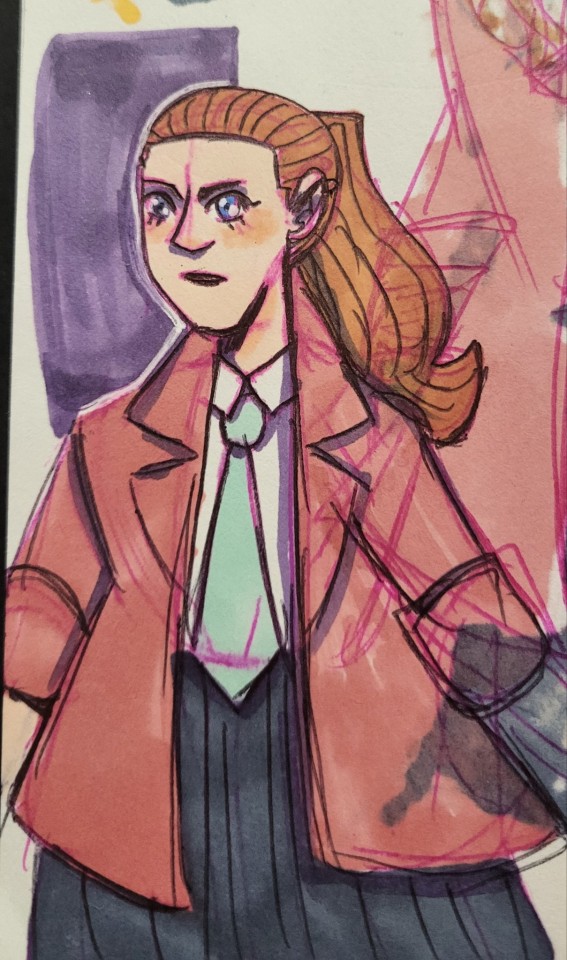
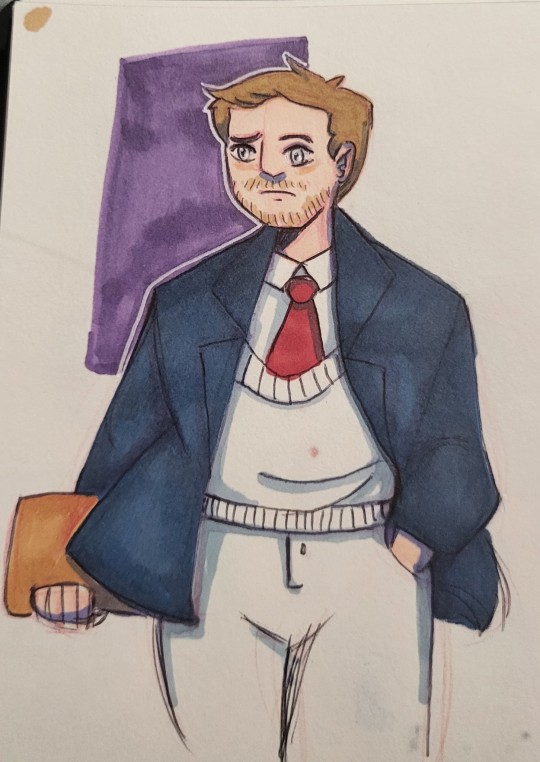
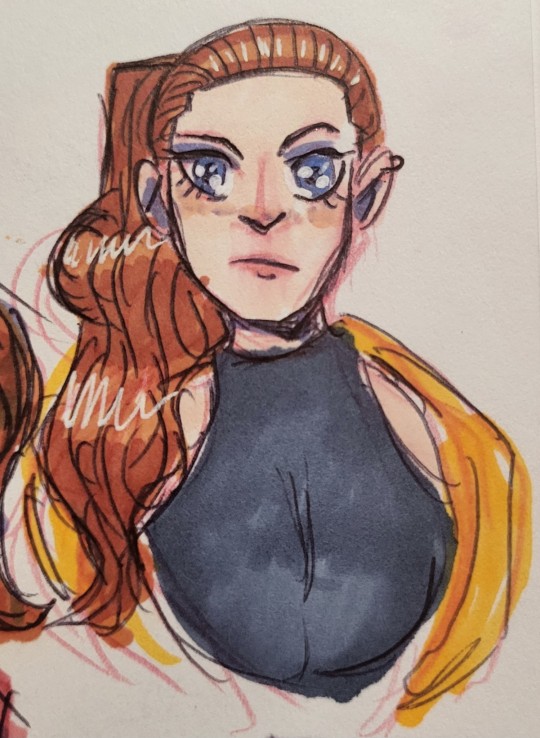
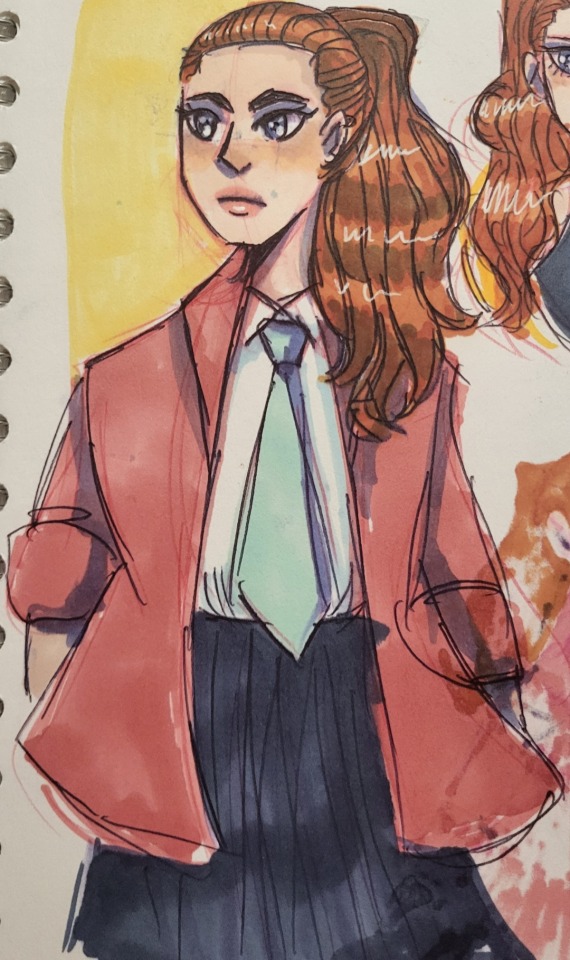
More niche 80s anime inspired doodles, featuring an attempt at a Jack that's not great, but not completely terrible, so I'll take it!!!
#Quantum Break#beth wilder#jack joyce#Urban Square: Kohaku no Tsuigeki#still amazes me that just changing the hair makes it Beth instead of Jesse...#I mean I think there are some subtle differences in how I approach them-like in thier expressions-but mainly? It's the hair...#my art#my doodles
10 notes
·
View notes
Text
Oh, don't mind me- I'm just trying to build a story about how when Parker was the master mind and Eliot was running ragged to help him relax (and sleep/doze,) she'd play with his hair. Eliot's sitting on the floor with his head on her lap and hair fanned over her jeans. All the while Hardison is sitting beside Parker playing computer games, his knee pressed against Eliot's shoulder.
Eliot's humming/purring and Hardison is slowly falling asleep and leaning closer, until eventually Hardison's head is on Parker's shoulder. And Parker is happy and content because she's safe and her boys are happy...
Is this sappy? Ridiculous? Has this been done before?
*sigh*
Maybe I won't write it...
#leverage#eliot spencer#parker leverage#alec hardison#set after season 5 and before leverage redemption#when parker is the master mind#eliot had been run ragged#hardison is playing on his computer#its mainly fluff#and domestic#and soft#i want to write something like this out#but I'm pretty sure it's already been written#so I won't#but please enjoy this tumblr post of my favorite thieves#aldis hodge#beth reisgraf#christian kane#these are my people#and I love them
26 notes
·
View notes
Text
anyone else thinking about how beth either a. does not remember diane or b. believes she was abandoned by both of her parents?
#stupid dumb fuckig cartoon making me emo#beth smith#beth sanchez#rick sanchez#diane sanchez#season 7 spoilers#rick and morty#rick and morty season 7#rick and morty spoilers#kinda#tagging spoilers bc this is mainly in reference to diane's fate#meposts
22 notes
·
View notes
Note
i too think noah will step away from acting. He might grow up and become involved in the bts business side of the industry perhaps, I think that would be an option for him. Working for a studio, producing, business manager etc. Or he might pivot out of that biz entirely. Tbh he’s a talented actor but his agents suck and haven’t gotten him anything decent, the industry is also not kind to out gay actors and I have a feeling casting directors got a “gay vibe” from noah and wouldn’t cast him for that reason unlike how finn got a ton of great stuff despite noah i think being a better actor. it sucks to say such things but the industry is still very homophobic and unless you can present as 100% heterosexual, it’s even harder. I always suspected noah knows the reality of this now as he’s gotten older and being more confident in himself and also exploring other options in life made him willing to come out because there’s no way he wasn’t told at some point, even if it wasn’t explicitly, by management or agents or anyone in the industry, that one must be straight publicly to get work. Plenty of other young actors have and celebs that have come out have said that they had that drilled into their heads. Maybe he decided to come out in a big way because he’s just not invested in continuing to pursue acting when the show is over. I swear I also remember seeing something where he said (pre coming out) that acting was fun but not everything to him, so maybe it’s not that deep at all and maybe he enjoys acting but it’s not something he’s that passionate about to devote his life to.
agreed. and it’s true, like i am sorry to this man (finn) but noah is the better actor 😭 they’re both good but noah is a natural. if he wants to stay in the industry, he needs a better agent 😩 and it’s funny re. his sexuality because finn is happy to play queer characters (stranger things, the goldfinch, IT). noah deserves the same opportunities. and a lot of people were convinced he was straight before he came out, and imo he seems to play the frat bro part well, so he’s capable of playing masculine and heterosexual characters. even though there’s nothing wrong with being straight and feminine, and masculine and gay. but yeah, hollywood sucks. and it’s good that noah likes learning new stuff and branching out, he looks like he wants to be busy 24/7, lol. extroverted king!
#beth answers#i think he’s gonna be on the same level as jamie bower#who mainly does small but iconic roles#like i screamed when i saw that he was gonna be in ST but confused bc he was gonna play an orderly?? like seriously?#but then it was like ooh OH he’s that bitch when it was revealed he was the show’s big bad lmao#i want to have my tiffany pollard moment and be like NOAH SCHNAPP?! when i’m watching smth new 🤩
4 notes
·
View notes
Text
honestly i think the reoccuring "clones" (evil morty, space beth) should go by new names because who tf can take calling someone 'evil morty' seriously
#random thoughts#guess what motherfuckers it's blue man time#space beth would go by anne!!! mainly because i like the idea of rick calling her 'oh poor little orphan annie' when she gets angsty#and evil morty goes by tim. also because i like the idea of rick going 'seriously??? that's your scary villain name fucking TIM'
2 notes
·
View notes
Text
Beth went through a metal "phase" in the mid-late 90s and early 2000s. She knew a lot of alternative kids, specifically a group of punks and emos and a group of metalheads. She shaved her head one day on the way back home from school and her dad did not approve. Since that day, she is ashamed and anxious about others knowing she likes that type of music.
#muse headcanons ¦¦ beth schwipps#|| it's not even a phase bc she shamefully listens to it in private#|| and collects band shirts#|| so she's just known as the woman with eclectic taste mainly in 60s-80s stuff
2 notes
·
View notes
Text
Debating adding the hybrid au in a few months….
#mainly for otter!nika and puppy!leah#woso hybrid au#yes they will have dicks bc#shhh#omg and otter aggie#and otter beth#and puppy niamh#and omg lion alexia#just all of my babys
1 note
·
View note
Text


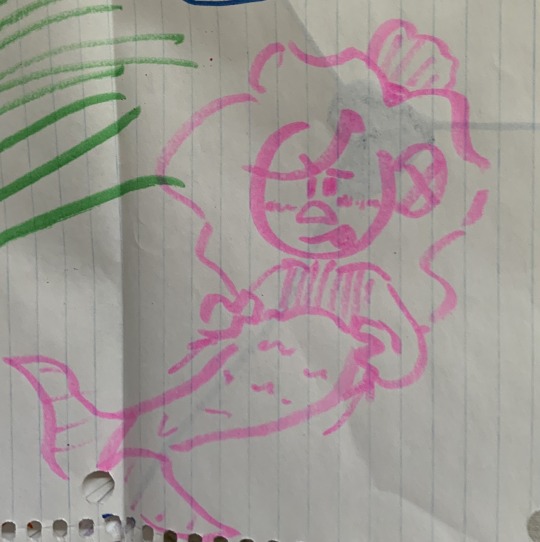
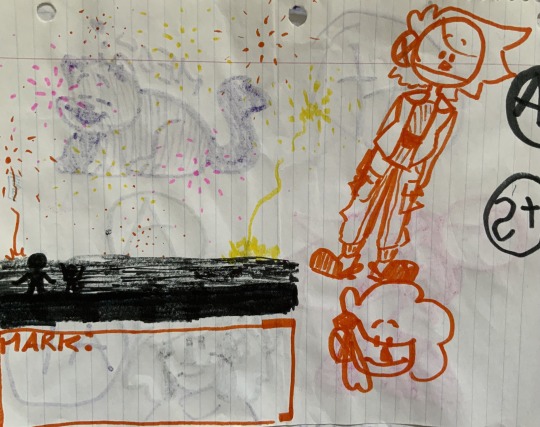

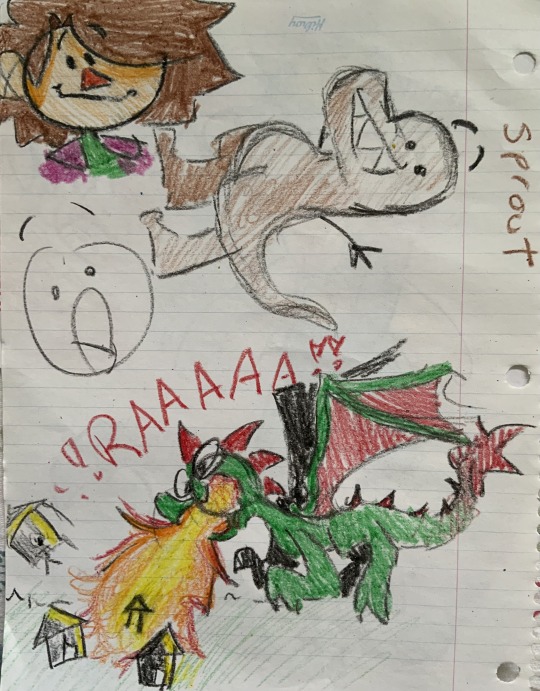
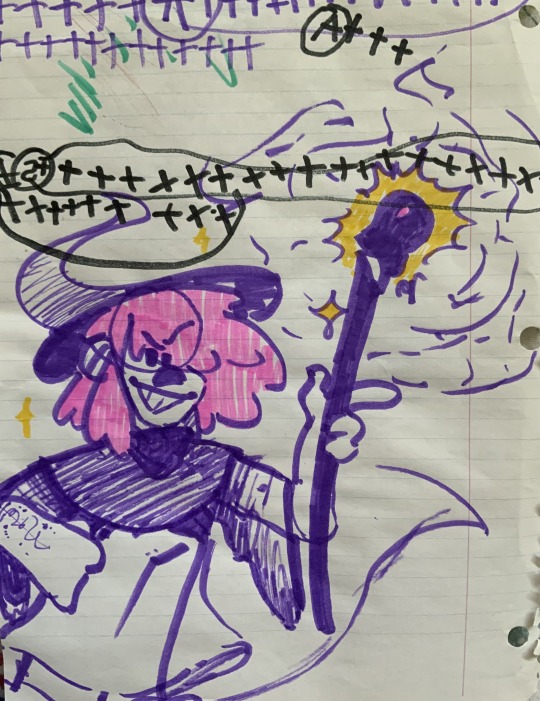

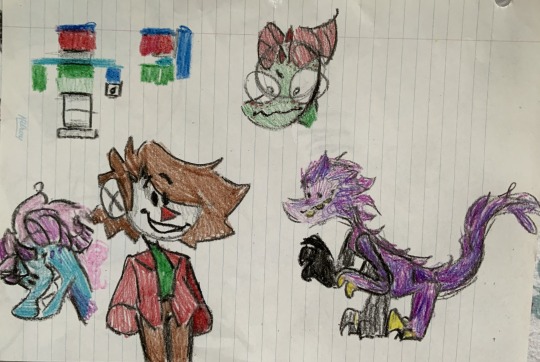




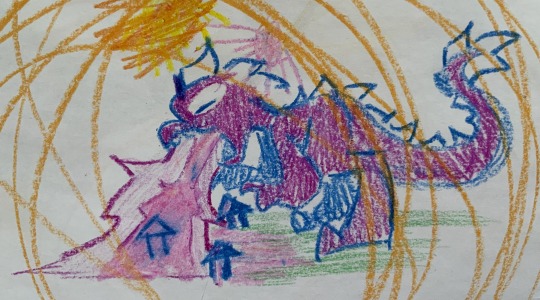
CAMP DOODS?????
LE CRAYÕN???? LE MÁRKOOR???? LE DRAGÓN??? LE MARMAIDE??? LE WIZÃRD???? LE—
#the children enjoyed drawing and thus I got to do some doodles—#I actually had more but the kids that asked me to draw them wished to keep them so alas#they were mainly some kind of creature destroying a town tho so your not missing out on much—#lmao anywhizzle—#the marker and crayon drawing was really fun actually.#have a good day#my drawings#school doods#meh#Felisha#Connor#solune#okra#Adalaide#niki#Beth#dulcie bellator#dog man
1 note
·
View note
Text

Y'ALL SEEING THIS SHIT ALSO I'M AN ALIEN
#my art#rick and morty#rick and morty fandom#rick and morty fanart#I see where they got their inspiration 😒 sure just steal form the tiny artists AMERICA#young beth#Beth Smith#Rick and Morty Beth#Honestly I think I like her hair better here I never really liked the cloth she has usually#They really need to update the Smiths' designs and I mean that with love#It's just mainly because the artstyle as a whole got a whole lot better so yk it'd make sense to update the characters a little...#At least more than a color palette update 💀#Yeah we see you Beth “White as Bones” Smith
10 notes
·
View notes
Text
I would do anything for a beth centric episode that doesn't revolve around her relationship w jerry. Like a beth psychoanalyzation episode, with her inner voice how she feels about raising her kids, how she feels about her dad coming back after so long of no contact, about herself. I wish we got some insight to how she was in her teens, was she resentful towards rick? Did she hate her mother? Were both of her parents absent like did diane in her universe raise her or did her grandparents or something I NEED TO KNOW

can we get beth and rick plotlines now as well
#beth smith#i made a thing that was about rick and young beth's father daughter relationship but it was mainly rick centric since the songs from the#moms point of view (never love an anchor)
23 notes
·
View notes
Text
As I've read different people's views on Little Women, I've realized that for different readers, it's a fundamentally different book.
When I see someone describe the "universal" experiences of identifying with Jo, wanting her to marry Laurie, and disliking Amy, I remember all the proof I've seen that these are far from universal. The latter two weren't even my experiences: identifying with Jo, yes, but shipping her with Laurie and disliking Amy, no!
Even people with equal amounts of knowledge of the historical context and of Louisa May Alcott's life seem to come away with vastly different feelings about the story and characters.
I suppose there are a wide variety of reasons for this. First and foremost, which of the four March sisters you personally admire or relate to the most. Then there are other factors like your gender, your age when you first read the book, your relationship (good or bad) with traditional femininity, whether you read Parts I and II as a single novel or as Little Women and Good Wives, your relationships with your own family members, your religion and ethical values...
The list goes on.
That post from @theevilanonblog that I reblogged recently about the different interpretations of Frankenstein makes me want to write out a similar list of ten different views I've read of Little Women. Here it is:
Little Women is about the March sisters learning to be proper virtuous women of their time and place. With Marmee as their role model (a role later shared by Beth as she becomes increasingly angelic in her illness), they learn to conquer their flaws, give up their wild ambitions, and settle down as good wives and mothers. This is especially true for Jo, whose character arc is a slow taming from a rough tomboy to a gentle nurturer. It's a conformist and anti-feminist message, which Alcott probably disliked, but she wrote it to cater to public tastes. (This reading seems mainly to come from critics who dislike the book.)
Little Women is about Jo's struggle to stay true to herself in a world that wants to change her. She struggles with whether to stay a tomboy or become a proper lady, whether or not to marry Laurie despite not loving him romantically, and as an author, whether to write what she wants, write what earns the most money, or give up her writing altogether. In the end, she changes only in ways that make her happy, e.g. by learning to control her temper, and later by embracing romantic love. But in more important ways, she stays true to herself: always remaining slightly rugged, clumsy and "masculine," finding success as a writer, and marrying Friedrich, a man just as plain and "unromantic" as herself, but whom she loves and who respects her as an equal.
Little Women is about learning to "live for others." That phrase is used often and could well be the arc words. Beth is the only March sister to whom a selfless life comes naturally, but the other three master it by the end of the story (as does Laurie). They learn to conquer their moments of pettiness and selfishness, to live in better harmony with each other and with their friends and love interests, and to give up their self-centered dreams of fame and wealth, building lives that focus on service instead.
Little Women is about growing up. The first half is mainly about the March girls' maturing by surviving hard times and learning to be better people, while the second half is about reaching adulthood and bittersweetly parting ways to start new lives. At the beginning, Jo is a girl who doesn't want to grow up: she wants to always be a wild young tomboy with her family (and Laurie) by her side forever. But of course, she can't stop time or womanhood, and is eventually forced to accept the loss of Meg, Amy, and Laurie to marriage and Beth to death. After grieving for a while, she lets go of her old life and willingly builds a new one with Friedrich.
Little Women is about family bonds and the fear of losing them. We meet and become attached to the wonderfully close, cozy March family, which gradually expands through friendships, marriage, and new babies. But throughout the story, the family is in danger of breaking apart, whether due to conflict (Jo and Amy's sibling rivalry, Meg and John's marital problems), or separation by distance (Father going away to war, Amy going to Europe, Jo to New York), or death (the danger of losing Father and Beth in Part I, and the ultimate loss of Beth in Part II). But in the end – unlike in reading #4 above – the family doesn't break apart and never will. Conflicts are resolved, travelers eventually come home, the surviving family members always live near each other and stay as close as ever, and even Beth isn't really gone, because her memory and influence live on.
Little Women is about femininity and each March sister's relationship with it. Meg and Amy happily conform in different ways: Meg to "domestic femininity" as a housewife, Amy to "ornamental femininity" as a society lady. Beth pressures herself to conform to self-effacing domestic femininity, until sadly, it kills her – either because she's too selfless and nurturing when she cares for the fever-infected Hummels, or because she has anorexia, as Lizzie Alcott might have had. But Jo strikes a successful balance in the end, conforming just enough to fit into society, but only on her own terms, and otherwise living a happily unconventional life as a writer and schoolmistress.
Little Women is about Jo's unlearning of internalized misogyny. At the beginning, she's a "Not Like Other Girls" tomboy, who wishes she were male, disdains feminine girls (especially her sister Amy), doesn't care enough when "her boy" Laurie behaves badly toward women, and is afraid to be vulnerable. But gradually, and without losing her strength of character, she learns to embrace the sweeter and more tender aspects of herself, sees that Amy's ladylike manners have practical benefits, and learns to say "no" to Laurie when he turns his childish, unhealthy romantic attentions to her. Then after Beth dies, she realizes how precious Beth's utterly domestic, feminine life was, and embraces a more domestic life herself. Yet by doing so, she becomes a true feminist, as she enters an egalitarian marriage and devotes her life to teaching boys to be good, respectful men.
Little Women is only what US Americans know as the first half. It's just about the March sisters getting by and learning moral lessons over the course of the year their father is away at war. Nobody gets married and nobody dies. Everything else is in Good Wives, which is a sequel with different character arcs and different themes, and which should be published separately, as it originally was and still is outside the US. Trying to tie them together into one narrative never feels quite right.
Little Women is Alcott's idealized version of her own life and family, where no one suffers quite as much as they did in real life, everyone is slightly less flawed, and Jo ends up happily married to a man very much like Alcott's lost love Henry David Thoreau. She wrote the life she wished she had.
Little Women is just a semi-autobiographical slice-of-life that Alcott wrote quickly for money.
Which is the truest to Alcott's intent? I don't know. But while some of these readings I like better than others – and some of them I despise – I'd say they're all understandable and reasonably valid. Some aren't even mutually exclusive, but can be used together... although of course, other readings are mutually exclusive, like whether the story is feminist or anti-feminist, or whether the March family ultimately breaks apart or holds together. And they're all worth using as springboards for discussion.
Alcott wrote more books than she ever realized she did, because Little Women can be many different books to different people.
@littlewomenpodcast, @joandfriedrich, @thatscarletflycatcher, @fictionadventurer, @fandomsarefamily1966
547 notes
·
View notes